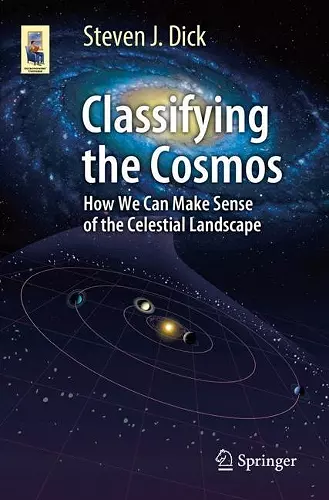Classifying the Cosmos
How We Can Make Sense of the Celestial Landscape
Format:Paperback
Publisher:Springer Nature Switzerland AG
Published:2nd Apr '19
Currently unavailable, our supplier has not provided us a restock date

Since the invention of the telescope 400 years ago, astronomers have rapidly discovered countless celestial objects. But how does one make sense of it all?
Astronomer and former NASA Chief Historian Steven J. Dick brings order to this menagerie by defining 82 classes of astronomical objects, which he places in a beginner-friendly system known as "Astronomy’s Three Kingdoms.” Rather than concentrating on technicalities, this system focuses on the history of each object, the nature of its discovery, and our current knowledge about it.
The ensuing book can therefore be read on at least two levels. On one level, it is an illustrated guide to various types of astronomical wonders. On another level, it is considerably more: the first comprehensive classification system to cover all celestial objects in a consistent manner.
Accompanying each spread are spectacular historical and modern images. The result is a pedagogical tour-de-force, whereby readers can easily master astronomy’s three realms of planets, stars, and galaxies.
“In his new book Classifying the Cosmos: How We Can Make Sense of the Celestial Landscape, Dick undertakes the monumental task of designing a classification system for all of astronomy. He even goes a step further by incorporating existing subfield classification schemes. In each object entry, Dick expertly employs his background as NASA Chief Historian andhis decades of experience as an astronomer at the US Naval Observatory to provide detailed historical context and rigorous scientific explanation.” (Will Saunders, Astrobites, November 21, 2019)
“Astronomer and former NASA historian Steven Dick endeavors to bring some order to the cosmic menagerie as we know it today. The result is an important and revelatory work that can be used by researchers, educators, and enthusiasts alike. … I found Classifying the Cosmos to be thoroughly researched and engaging. … I would say that he has succeeded most admirably. I would also add that the book will be a handy reference for researchers and communicators of astronomy.” (William H. Waller, Physics Today, Vol. 72 (11), November, 2019)
ISBN: 9783030103798
Dimensions: unknown
Weight: unknown
458 pages
2019 ed.